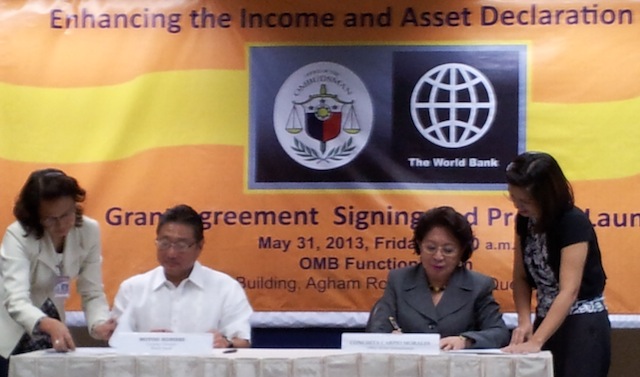SUMMARY
This is AI generated summarization, which may have errors. For context, always refer to the full article.

MANILA, Philippines – Here’s another reminder to government officials and employees to fill out their Statements of Assets, Liabilities, and Net Worth (SALN) forms properly. It’s also a warning against crooks in government who plan to use their positions to illegally amass wealth.
The Office of the Ombudsman is building an electronic database of the SALN submissions. Once completed, it will be easier to conduct lifestyle checks and to access the forms.
“The Project aims to improve the effectiveness of the system of filing and analyzing SALNs by transforming the manual-based system into an electronic or IT-based system, streamlining business processes and procedures, enhancing the monitoring and enforcement of the SALN requirements, and improving transparency and access to the SALNs,” the statement of the Office of the Ombudsman reads.
Ombudsman Conchita Carpio Morales and World Bank country director Motoo Konishi signed on Friday, May 31, a grant amounting to US$230,000 or about P9.2 million to computerize the system.
“Bad elements are keeping up with the times and employing the most sophisticated means of acquiring and hiding their ill-gotten wealth,” Morales was quoted in an Ombudsman press statement. “It behooves any anti-graft body to arm itself with upgraded weapons and superior counter-tactics to crush the enemy,” she added.
Konishi said the grant represents the World Bank’s support to the Aquino administration’s anti-corruption drive. “When public funds are rightly spent, citizens get the education, health care and social services they have paid for and deserve; roads lead to markets; businesses flourish and more people get decent jobs,” Konishi said.
Key offices, however, do not submit their SALN forms to the Office of the Ombudsman. These are the Supreme Court, the Senate and the House of Representatives. The SALN forms in these offices are filed internally. They have their own rules governing SALN release.
The SALN of senators can be easily accessed. But it’s not the case with the Supreme Court and the House of Representatives.
For a long time the Supreme Court refused to make public the SALN of justices.
The House of Representatives, on the other hand, annually releases summaries of the total assets, total liabilities, and net worth of the members. But House members have the sole prerogative to release their SALNs. During the Corona trial, Speaker Feliciano Belmonte Jr created a committee to review its policy in releasing SALN. The 15th Congress is about to close but new rules have not been issued. (READ: Corona impeached a year ago; where are solons’ SALNs?)
Lessons from Corona trial
The 2012 Corona trial prompted the Supreme Court to overturn a two-decades-old ruling that kept the SALN of SC justices a secret. (READ: SC issues guidelines on SALN release).
In the first completed impeachment trial in the Philippines, then Chief Justice Renato Corona was convicted for failing to declare his assets in his SALN.
Facing the impeachment court, Corona admitted he had US$2.4 million in bank deposits. His lawyers maintained he was not required to disclose it under bank secrecy rules covering dollar deposits. The impeachment court disagreed.
The Office of the Ombudsman played a key role in disclosing Corona’s dollar accounts. The bank secrecy law expressly states that no foreign currency deposis may be examined without the “written permission of the depositor.”
But the Office of the Ombudsman – acting on separate cases filed before the anti-graft court – was able to go around it using the SALN form. (READ: How the Ombudsman got access to CJ’s dollars).
The SALN acts as a waiver that empowers the Office of the Ombudsman to verify declarations in the form. The Ombudsman cannot get bank records from banks but it can seek assistance from the Anti-Money Laundering Council (AMLC), which it did during the Corona trial. It was the first time that the SALN waiver was interpreted that way.
Easier access
After the Corona trial, the Office of the Ombudsman decided to issue new rules relaxing public access to SALN. Memorandum Circular No. 03 practically means “everything is open unless restricted,” according to Assistant Ombudsman Asryman Rafanan. This is an improvement from the old rule that “everything is secret unless allowed,” he added.
Requesting parties only need to subscribe to the SALN Request Form, present the required identification cards, and pay minimal reproduction/certification fees.
Republic Act 6713 requires government officials to submit their SALN every year. Failure to comply with requirements is punishable by suspension or dismissal.
The following offices submit their SALN forms to the Ombudsman: constitutional and national elective officials. They are the Office of the President, Office of the Vice President, Commission on Elections, Commission on Audit, and Commission on Human Rights.
Regional and local officials and employees also file their SALNs before the Deputy Ombudsman in their respective regions. All other public officials and employees file their SALNs with the Civil Service Commission. – Rappler.com
Add a comment
How does this make you feel?
There are no comments yet. Add your comment to start the conversation.